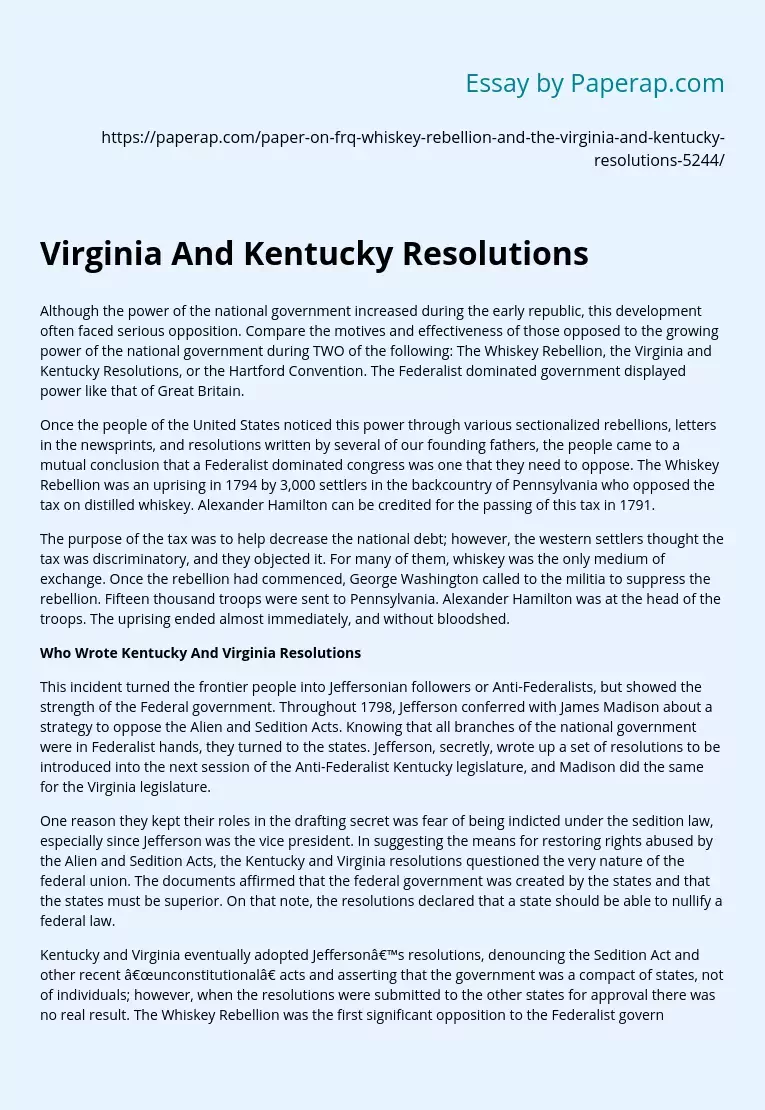Virginia And Kentucky Resolutions
Although the power of the national government increased during the early republic, this development often faced serious opposition. Compare the motives and effectiveness of those opposed to the growing power of the national government during TWO of the following: The Whiskey Rebellion, the Virginia and Kentucky Resolutions, or the Hartford Convention. The Federalist dominated government displayed power like that of Great Britain.
Once the people of the United States noticed this power through various sectionalized rebellions, letters in the newsprints, and resolutions written by several of our founding fathers, the people came to a mutual conclusion that a Federalist dominated congress was one that they need to oppose.
The Whiskey Rebellion was an uprising in 1794 by 3,000 settlers in the backcountry of Pennsylvania who opposed the tax on distilled whiskey. Alexander Hamilton can be credited for the passing of this tax in 1791.
The purpose of the tax was to help decrease the national debt; however, the western settlers thought the tax was discriminatory, and they objected it.
For many of them, whiskey was the only medium of exchange. Once the rebellion had commenced, George Washington called to the militia to suppress the rebellion. Fifteen thousand troops were sent to Pennsylvania. Alexander Hamilton was at the head of the troops. The uprising ended almost immediately, and without bloodshed.
Who Wrote Kentucky And Virginia Resolutions
This incident turned the frontier people into Jeffersonian followers or Anti-Federalists, but showed the strength of the Federal government. Throughout 1798, Jefferson conferred with James Madison about a strategy to oppose the Alien and Sedition Acts.
Knowing that all branches of the national government were in Federalist hands, they turned to the states. Jefferson, secretly, wrote up a set of resolutions to be introduced into the next session of the Anti-Federalist Kentucky legislature, and Madison did the same for the Virginia legislature.
One reason they kept their roles in the drafting secret was fear of being indicted under the sedition law, especially since Jefferson was the vice president. In suggesting the means for restoring rights abused by the Alien and Sedition Acts, the Kentucky and Virginia resolutions questioned the very nature of the federal union. The documents affirmed that the federal government was created by the states and that the states must be superior. On that note, the resolutions declared that a state should be able to nullify a federal law.
Kentucky and Virginia eventually adopted Jefferson’s resolutions, denouncing the Sedition Act and other recent “unconstitutional” acts and asserting that the government was a compact of states, not of individuals; however, when the resolutions were submitted to the other states for approval there was no real result. The Whiskey Rebellion was the first significant opposition to the Federalist government; demonstrating the lack of power to the minority and the majority (the people of the backcountry), but the rebellion unfortunately failed after being confronted with the force of the government.
The importance of the Kentucky and Virginia resolutions lie in the fact that they were later considered to be the first notable statements of the states’ rights of government, a resolution that opened the way for the nullification controversy. Another note to be kept in mind is that the Alien and Sedition Act were written by the Federalist Party in order to maintain power in congress. The Whiskey Rebellion and The Kentucky and Virginia Resolutions were two contributing forces to the ultimate opposition of the Federalist dominated government.
Virginia And Kentucky Resolutions. (2019, Dec 05). Retrieved from https://paperap.com/paper-on-frq-whiskey-rebellion-and-the-virginia-and-kentucky-resolutions-5244/

